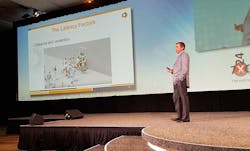Data Center Conferences: Make Your Next Presentation Awesome
Bill Kleyman is CTO of MTM Technologies and a veteran of many tech conferences, and a presenter at events including VMworld, Citrix Synergy, Cloud Camp, Interop and Data Center World. We asked Bill to share his tips on conferences both as an attendee and speaker. In part one he shared How to Get the Most Out of Data Center Conferences. Today Bill addresses conference presentations.
Public speaking is not easy. There are people who can easily get up on stage and present, and others that struggle. In reality, just about everyone can deliver great presentations.
If you’re a speaker at an upcoming conference, you’re overcoming a huge fear. For many people, getting up in front of a crowd can be literally scarier than dying. According to a Chapman University Survey on American Fears, overall, fear of public speaking is America’s biggest phobia – 25.3 percent say they fear speaking in front of a crowd. Clowns (7.6 percent feared) are officially scarier than ghosts (7.3 percent), but zombies are scarier than both (8.9 percent).
If you’re getting up on that stage or podium, you’ve already overcome the absolutely biggest hurdle there is. If you have a massive fear of public speaking, start small. As in very small – practice with a person or two. This will help you get more comfortable with your own content and how to tell the story.
Over the years, I’ve had the chance to attend many conferences and speak at quite a few of them. I’ve also heard a lot of people speak. In my experience, there are some great best practices to follow when it comes to creating an engaging presentation and conversation.
Presentation Prep
Use your social media channels to boost interest in your presentation. Bill uses Twitter and Facebook to network when he’s at a a conference. (Photo: Bill Kleyman)
Review your deck and practice, but don’t “memorize” it. Novice speakers feel like they have to memorize every inch of their slide and every word on the page. After you present a few times, you’ll see that this really isn’t the case. If you memorize your deck – you’ll likely sound like a robot. It’ll feel less natural and any change or variation could throw you off entirely. Instead of memorizing your deck, ensure that you know the content and the flow. As long as you generally know what should be on a slide and how it flows into your story, you’re good. You don’t have to hit every point on a slide! Sometimes a point speaks for itself and just flows into a story. That’s the difference between people focusing on you rather than something on a screen.Presentation Dos and Donts
On that note, there are definitely some things you should try to avoid doing when delivering a solid conversation or presentation around data centers.
- Never read off of your slides! Again, do not “memorize” your deck; try to tell a story. I mentioned this earlier, and need to mention it again. Basically, if you do this, you’ll have a mediocre presentation that might be hit or miss. Tell a story that your slides back up, not the other way around.
- If you get lost or stuck… This is major anxiety for some speakers. Knowing how to handle these moments can help. Take a deep breath, compose yourself and move on. Say something like “hang on one sec, let me review my notes… ah, here we are,” and keep going. Taking a few second or even a quick minute break to gather your thoughts is completely fine, and way better than just sputtering through the rest of the presentation.
- Pace yourself. Slow down when making important points. Nerves can definitely make us speed up. Flying through a deck won’t help anyone. If you’re afraid of speaking, you probably want it to be over quickly. Honestly, that’s not the best way to go. Pace yourself, know your story, and know how long it takes to tell it clearly.
- Try to walk around a bit, don’t stand behind a podium. This might be a personal preference, but I don’t like having something between me and the audience. Even in some smaller presentations, I’ll hop off a podium or a stage and walk around the room; trying to engage more people. In these situations, I want to remove barriers and engage more with the room. Consider this, if the situation allows it.
- Measure audience response and attentiveness. If you completely ignore your audience, they’ll know it and ignore you too. Make sure to scan the room and read how people are responding to your session.
- Engage your audience, and find pauses to ensure the message is sinking in. Making eye contact with people in the room can have a great impact. Listeners will feel that your presentation is more personal. Flow through the room, look at people, and make sure people are paying attention. You’ll want to know if you’re losing people sooner rather than later. This at least gives you a chance to adjust.
- Be interactive with questions, random prizes for answers, and even a joke or two. I love inserting breaks or pauses into the story. Ask a question, talk about an audience experience, take a poll and give out a prize. These are absolutely great ways for people to put down their phones or even further increase their attention on your content. This is a really great way to interact and get the audience to connect with you.
- Have the right level of energy. I’ve seen people who basically travel all night, get into the event in the morning, and then deliver a stellar presentation. How do they do it? Coffee, maybe an energy drink, and lots of preparation. They also probably know that content or story like the back of their hands. Make sure you have the right amount of energy to make the presentation engaging.
- Never forget a call to action and a solid summary. Try not to just end on a technical or business note. Summarize what people learned, and let people know what they can do to learn more.
- Let people know how to reach you! Too often great speakers forget to let their audience know how they can reach out to them. Make sure you include your social media information and how people can contact you at the end. You’d be surprised how many new friends and business contacts you’ll make that way! (You can find me on Twitter or LinkedIn).
Here’s a key point: Don’t try to please everyone. This tip falls into the category of being afraid to present. I’m sure you don’t want people to judge you. You’re going to have to get over it. If you try to please everyone, you might end up pleasing no one. Here’s the somewhat harsh but likely reality: Not everyone is going to like your presentation. When I get up to speak, I completely understand that I might not reach everyone. I’m still going to try very hard – but sometimes it just doesn’t click. However, there will be those that truly enjoy your content, engage with you, and want to learn more.
Your goal is to impact as many people as possible, while still staying true to your story, content, and presentation.
This may be a lot to take in, especially if you’ve yet to become a seasoned speaker. But after you get your first few speaking engagements out of the way, it genuinely becomes easier. You’ll understand your audience, know when to make changes, and even how to adjust on the fly.
Find your passion, tell an engaging story, and watch your audience take it all in. With practice and experience, you’ll be out there giving awesome presentations!
About the Author



